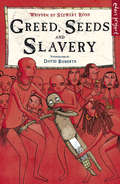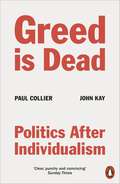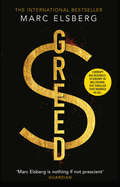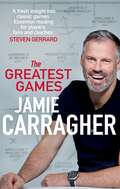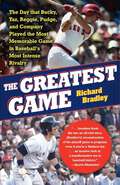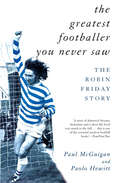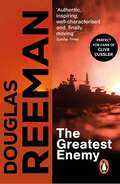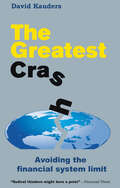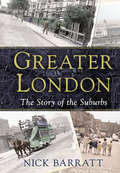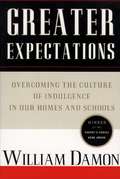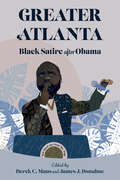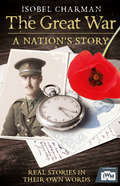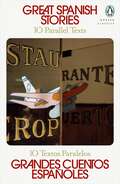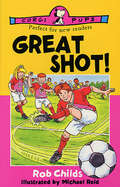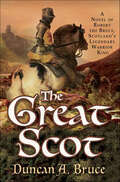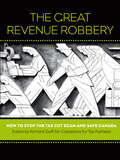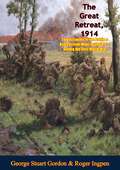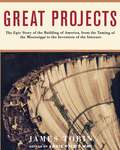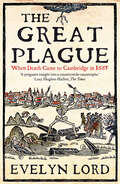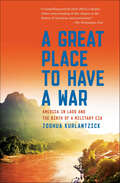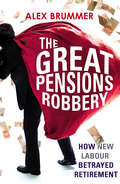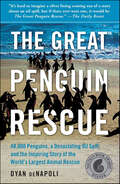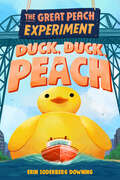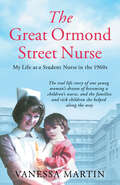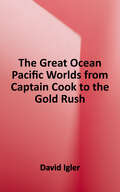- Table View
- List View
Greed, Seeds and Slavery
by Stewart RossCommemorating the 200th anniversary of the abolition of the Slave Trade Act, this collection of eleven stories follows the lives of slaves of every kind around the world. Join African Queen Jinga as she unites the tribes of Ndongo against the invading Portuguese. Watch John Blanke as he becomes the first black trumpeter to play for the King Henry VIII. Meet Harriet Tubman as she helps escaped slaves flee along the Underground Railroad to freedom.Moving, exciting and often funny, these true stories span centuries and the globe, feature famous historical figures such as William Wilberforce and Catherine of Aragon and remind us all of the true horrors of slavery in all its forms.
Greed Is Dead: Politics After Individualism
by Paul Collier John KayTwo of the UK's leading economists call for an end to extreme individualism as the engine of prosperity 'provocative but thought-provoking and nuanced' TelegraphThroughout history, successful societies have created institutions which channel both competition and co-operation to achieve complex goals of general benefit. These institutions make the difference between societies that thrive and those paralyzed by discord, the difference between prosperous and poor economies. Such societies are pluralist but their pluralism is disciplined.Successful societies are also rare and fragile. We could not have built modernity without the exceptional competitive and co-operative instincts of humans, but in recent decades the balance between these instincts has become dangerously skewed: mutuality has been undermined by an extreme individualism which has weakened co-operation and polarized our politics.Collier and Kay show how a reaffirmation of the values of mutuality could refresh and restore politics, business and the environments in which people live. Politics could reverse the moves to extremism and tribalism; businesses could replace the greed that has degraded corporate culture; the communities and decaying places that are home to many could overcome despondency and again be prosperous and purposeful. As the world emerges from an unprecedented crisis we have the chance to examine society afresh and build a politics beyond individualism.
Greed: The page-turning thriller that warned of financial melt-down
by Marc ElsbergCORRUPT BIG BUSINESS, ECONOMY IN MELTDOWN, THE THRILLER THAT WARNED US ALL'Marc Elsberg is nothing if not prescient' GUARDIANIt’s the near future: the world economy is in freefall. Mass unemployment and hunger rage as banks, corporations and countries go bankrupt. But one group are doing just fine: the super-rich.Nobel prize-winning economist Herbert Thompson drives to an emergency summit in Berlin, to deliver his ground-breaking solution to the world’s elite: a formula that will reverse the downturn, transform the economy, and give everyone a share of the wealth.Thompson never arrives. He is killed in a car crash on the way.Jan, a keen cyclist out late, sees the incident. Convinced Thompson has been murdered, he vows to find out why.But there are powerful forces at work, who will stop at nothing to keep Jan silent.How far will they go to satisfy their greed? And who can stop them?A spine-chillingly realistic thriller on the horrors of freewheeling capitalism and the threat of human greed.By the global bestselling author of Blackout and Code Zero_____________PRAISE FOR MARC ELSBERG‘Fast, tense, thrilling, timely. This will happen one day’ LEE CHILD‘Dazzling’ Times Book of the Month'Both gripping and visionary' rbb Kulturradio'Elsberg succeeds in combining complex storylines into one breathtaking tale of suspense' BILD'Part Dan Brown-style chase and part eco-thriller, this debut will get people talking' BOOKLIST US
The Greatest Games: The ultimate book for football fans inspired by the #1 podcast
by Jamie Carragher'Essential reading for players, fans and coaches' - Steven Gerrard 'A cracking read' - Chris Evans'I couldn't put it down' - Joey BartonWhat are the greatest games ever played? From Jurgen Klopp to Gary Neville, Xavi to David Beckham, Jamie Carragher speaks with teammates, rivals, managers and legends of the sport to identify and analyse football's greatest encounters.As Carra and his contributors take you into the dressing rooms and out onto the pitches of the world's most celebrated stadiums, they relive some of the defining moments of their playing careers as well as many more from the greatest football matches ever played - from title deciders and cup finals to against-all-odds comebacks, tactical masterclasses and old school classics. Packed full of hilarious stories, exclusive anecdotes and refreshing appraisals, in The Greatest Games Jamie Carragher takes you into the heart of these matches, revealing new insights into the teams, players and coaches that have shaped football.
The Greatest Game: The Yankees, The Red Sox, And The Playoff Of '78
by Richard BradleyIn this spellbinding book, Richard Bradley tells the story of what was surely the greatest major league game of our lifetime and perhaps in the history of professional baseball. That game, played at Fenway Park on the afternoon of October 4, 1978, was the culmination of one of the most tense, emotionally wrought seasons ever, between baseball's two most bitter rivals, the Boston Red Sox and the New York Yankees. Both teams finished this tumultuous season with identical 99-64 records, forcing a one-game playoff. With a one-run lead and two outs, with the tying run in scoring position in the bottom of the ninth, the entire season came down to one at-bat and to one swing of the bat. It came down, as both men eerily predicted to themselves the night before, to the aging Red Sox legend, Carl Yastrzemski, and the Yankees' free-agent power reliever, Rich "Goose" Gossage. Anyone who calls himself a baseball fan knows the outcome of that confrontation. And yet such are the literary powers of the author that we are pulled back in time to that late-afternoon moment and become filled anew with all the taut sense of drama that sports has to offer, as if we don't know what happened. As if the thoughts swirling around in the heads of pitcher and hitter are still fresh, both still hopeful of controlling events. That climactic game occurred thirty seasons ago and yet it still captures our imagination. In this delightful work of sports literature, we watch the game unfold pitch by pitch, inning by inning, but Bradley is up to something more ambitious than just recounting this wonderful game. He also tells us the stories of the participants -- how they got to that moment in their lives and careers, what was at stake for them personally -- including the rivalries within the rivalry, such as catcher Carlton Fisk versus catcher Thurman Munson,and Billy Martin versus everyone. Using a narrative that alternates points of view between the teams, Bradley reacquaints us with a rich roster of characters -- Freddy Lynn, Ron Guidry, Catfish Hunter, Mike Torrez, Jerry Remy, Lou Piniella, George Scott, and Reggie Jackson. And, of course, Bucky Dent, who craved just such a moment in the sun -- a validation he had vainly sought from the father he barely knew. Not a book intended to celebrate a triumph or lament a loss, The Greatest Game will be embraced in both Boston and New York, with fans of both teams recalling again the talented young men they once gave their hearts to. And fans everywhere will be reminded how utterly gripping a single baseball game can be and that the rewards of being a fan lie not in victory but in caring beyond reason, even decades after the fact.
The Greatest Footballer You Never Saw: The Robin Friday Story
by Paolo Hewitt Paul McGuiganRobin Friday was an exceptional footballer who should have played for England. He never did. Robin Friday was a brilliant player who could have played in the top flight. He never did. Why? Because Robin Friday was a man who would not bow down to anyone, who refused to take life seriously and who lived every moment as if it were his last. For anyone lucky enough to have seen him play, Robin Friday was up there with the greats. Take it from one who knows: 'There is no doubt in my mind that if someone had taken a chance on him he would have set the top division alight,' says the legendary Stan Bowles. 'He could have gone right to the top, but he just went off the rails a bit.' Loved and admired by everyone who saw him, Friday also had a dark side: troubled, strong-minded, reckless, he would end up destroying himself. Tragically, after years of alcohol and drug abuse, he died at the age of 38 without ever having fulfilled his potential. The Greatest Footballer You Never Saw provides the first full appreciation of a man too long forgotten by the world of football, and, along with a forthcoming film based on Friday's life, with a screenplay by co-author Paolo Hewitt, this book will surely give him the cult status he deserves.
The Greatest Enemy: an all-guns-blazing tale of naval warfare from Douglas Reeman, the all-time bestselling master storyteller of the sea
by Douglas ReemanThis compelling nautical adventure from multi-million copy bestselling author Douglas Reeman will have readers of Clive Cussler, Bernard Cornwell and Wilbur Smith gripped with its expertly combined characterisation and vivid battle scenes. You'll feel like you are on the bridge yourself...!'One of our foremost writers of naval fiction' -- Sunday Times'I could not put it down. I enjoyed every single page of this seafaring tale.' -- ***** Reader review'Enthralling - just had to keep reading to the end' -- ***** Reader review'A cracking read' -- ***** Reader review'Exceptional' -- ***** Reader review'Nail biting to the end' -- ***** Reader review****************************************************************************Twenty-five years ago, HMS Terrapin was part of a crack hunter-killer group in the Battle of the Atlantic. Now she is working out her last commission in the Gulf of Thailand.To Lieutenant-Commander Standish, the frigate seems to mark the end of his hopes of a career in the Navy. Then a new captain arrives, a man driven by an old-fashioned, almost obsessive patriotism. And under his stubborn leadership, Standish and the crew discover a long-forgotten unity of purpose...She was one of the deadliest ships of the war. Her greatest heroics may still lie ahead.
The Greatest Crash: Avoiding the financial system limit
by David Kauders"Radical thinkers might have a point" - Financial Times The Greatest Crash argues that the financial system which evolved from the early Italian bankers has now reached a roadblock. The weight of debt already created prevents further economic expansion, while paying down the debt shrinks economies. To escape this trap, evolution is needed. But bureaucratic design, delegated government, and group think, all combine to prevent evolution.
Greater London: The Story of the Suburbs
by Nick BarrattLondon's suburbs may stretch for well over 600 square miles, but in historical accounts of the capital they tend to take something of a back seat. In Greater London, historian Nick Barratt places them firmly centre stage, tracing their journey from hamlets and villages far out in the open countryside to fully fledged urban enclaves, simultaneously demonstrating the crucial role they have played in the creation of today's metropolis.Starting in the first century AD, he shows how the tiny settlements that grew up in the Thames Valley gradually developed, and how they were shaped by their proximity to the city. He describes the spread of the first suburbs beyond the city walls, and traces the ebb and flow of population as people moved in to find jobs or away to escape London's noise and bustle. He charts the transformation wrought by the coming of the railways, the fight to preserve Hampstead Heath, Epping Forest and other green spaces and the struggle to create a London-wide form of government. He gives an account of wartime destruction and peacetime reconstruction, and then brings the story to the present with a description of the very varied nature of today's suburbs and their inhabitants. In the process, he evokes Tudor Hackney and Georgian Hampton, explains why Victorian Battersea and Finchley were so different from one another, and follows Islington's fall from grace and subsequent recovery.Magnificently illustrated throughout with contemporary engravings and photographs, this is the essential history for anyone who has ever lived in London.
Greater Expectations: Overcoming the Culture of Indulgence in Our Homes and Schools
by William DamonGreater Expectations is the book that exposed the low standards that children are confronted with in our homes, our schools, and throughout our culture. It exploded many of the misconceptions about children and how to raise them, including the cult of self-esteem, "child-centered" learning, and other overly indulgent practices that have been watering down the education and guidance that we are providing our young people. It disclosed how the self-centered ethic is damaging our youth. Greater Expectations started America talking about these issues and about how young people need to be provided with challenges and a sense of purpose if we want them to survive and thrive in life.Provocative and challenging, Greater Expectations was a wake-up call, a must-read for anyone concerned about the growing youth crisis in America and what we can do about it.
Greater Atlanta: Black Satire after Obama
by Derek C. Maus and James J. DonahueContributions by GerShun Avilez, Lola Boorman, Thomas Britt, John Brooks, Phillip James Martinez Cortes, Derek DiMatteo, Tikenya Foster-Singletary, Alexandra Glavanakova, Erica-Brittany Horhn, Matthias Klestil, Abigail Jinju Lee, Derek C. Maus, Danielle Fuentes Morgan, Derek Conrad Murray, Kinohi Nishikawa, Sarah O'Brien, Keyana Parks, and Emily Ruth RutterThe seventeen essays in Greater Atlanta: Black Satire after Obama collectively argue that in the years after the widespread hopefulness surrounding Barack Obama’s election as president waned, Black satire began to reveal a profound shift in US culture. Using the four seasons of the FX television show Atlanta (2016–22) as a springboard, the collection examines more than a dozen novels, films, and television shows that together reveal the ways in which Black satire has developed in response to contemporary cultural dynamics. Contributors reveal increased scorn toward self-proclaimed allies in the existential struggle still facing African Americans today.Having started its production within a few weeks of Donald Trump’s (in)famous escalator ride in 2015, Atlanta in many ways is the perfect commentary on the absurdities of the contemporary cultural moment. The series exemplifies a significant development in contemporary Black satire, which largely eschews expectations of reform and instead offers an exasperated self-affirmation that echoes the declaration that Black Lives Matter.Given anti-Black racism’s lengthy history, overt stimuli for outrage have predictably commanded African American satirists’ attention through the years. However, more recent works emphasize the willful ignorance underlying that history. As the volume shows, this has led to the exposure of performative allyship, virtue signaling, slacktivism, and other duplicitous forms of purported support as empty, oblivious gestures that ultimately harm African Americans as grievously as unconcealed bigotry.
The Great War: The People's Story (Official TV Tie-In)
by Isobel CharmanDuring the First World War three quarters of a million British people died – a figure so huge that it feels impossible to give it a human context. Consequently we struggle to truly grasp the impact this devastating conflict must have had on people's day-to-day lives. We resort to looking at the war from a distance, viewing its events in terms of their political or military significance. The Great War: The People's Story is different. Like the all-star ITV series it accompanies, it immerses the reader in the everyday experiences of real people who lived through the war. Using letters, diaries, and memoirs – many of which have never previously been published – Isobel Charman has painstakingly reconstructed the lives of people such as separated newly-weds Alan and Dorothy Lloyd, plucky enlisted factory-worker Reg Evans and proudly independent suffragist Kate Parry Frye. A century on, they here tell their stories in their own words, offering a uniquely personal account of the conflict.The Great War: The People's Story is both a meticulously researched piece of narrative history and a deeply moving remembrance of the extraordinary acts of extremely ordinary people.
Great Spanish Stories: 10 Parallel Texts (Parallel Texts)
by VariousA riveting selection of short stories in Spanish alongside their English translations This new dual-language edition of ten stories selected from The Penguin Book of Spanish Short Stories celebrates some of the very best twentieth-century literature from Spain. Each story appears in Spanish alongside an expert English translation, providing unique cultural insight and literary inspiration for language learners. Ranging from a poignant tale of betrayal to a darkly humorous exchange between wedding guests, this captivating collection includes works from authors such as Leopoldo Alas (Clarín), Cristina Fernández Cubas, Medardo Fraile, Carmen Martín Gaite, Karmele Jaio, Carmen Laforet, Javier Marías, Carme Riera, Manuel Rivas, and Esther Tusquets.
Great Shot!
by Rob ChildsHave a go! Shoot!"Tom, captain of the school football team, can't believe what is happening. Everyone in the team is scoring goals - except him. He even misses a penalty! But when his teammate Jonty is suddenly in danger, Tom needs to find his shooting boots again - and quickly!
The Great Scot: A Novel of Robert the Bruce, Scotland's Legendary Warrior King
by Duncan A. BruceRobert the Bruce was Scotland's greatest King ever. The Bruce, as he was known, was crowned King of Scots in 1306, a time when the ancient kingdom of Scotland was under harsh and illegal English occupation. As soon as King Robert began his reign, his army was treacherously attacked at Methven, resulting in a calamitous defeat for the Scots which forced the Bruce into hiding. Yet, steadily between 1307 and 1313 King Robert won battle after battle, shunning pitched medieval clashes, and fighting as a guerilla force, a form of warfare which he, perhaps, invented.The war peaked in 1314 when the Bruce faced a formidable English invasion. With brilliant tactics and resolute bravery the vastly outnumbered Scots defeated and routed the knights, archers, and foot soldiers of mighty England at the Battle of Bannockburn. And that's only the first part of this epic tale of the Bruce's long and event-filled life.The Great Scot is a novel filled with valor, treachery, passionate love, journeys great and small, and people of every rank and situation-all from the pages of Scottish history.
The Great Revenue Robbery: How to Stop the Tax Cut Scam and Save Canada
by Canadians for Tax FairnessAny attempt to restore responsible environmental policies, revive and expand our social programs, rebuild our crumbling infrastructure, and boost our flagging economy will be inadequate unless we also address the need to increase governments’ fiscal capacity. The tax system can also play a key role in closing the gap between rich and poor––a gap that is undermining the health of our economy and threatening damage to our democracy. Until recently, many progressive groups, including progressive political parties, have shied away from advocating for tax fairness and tax reform, fearing that the issue is political dynamite. Right wingers have encountered little opposition to their calls for deep tax cuts, especially for the rich and for corporations. But the tide is turning. Public opinion polls tell us that faced with growing inequality and cutbacks to government programs, Canadians now strongly support tax fairness, including higher taxes on the rich and on corporations. The Great Revenue Robbery is a collective effort to stimulate much-needed discussion about how tax policy can help rebuild our social programs, reduce the gap between rich and poor, restore environmental responsibility, and revitalize our country’s democracy.
The Great Retreat, 1914: During the First World War [Illustrated Edition]
by George Stuart Gordon Roger IngpenIncludes The First World War On The Western Front 1914-1915 Illustrations Pack with 101 maps, plans, and photos.“Two views of the Great RetreatImperial Germany had long planned the conflict that was to become the First World War, but when the onslaught came there was little sign that the nations which would be embroiled were prepared for the storm. Germany advanced in the east and west where French and Belgian armies were forced to retire by overwhelming odds. The small British Army, the 'B. E. F', was rushed to the continent with most of its troops having less than a week between garrison life and the firing line. Under Sir John French, it was allocated the western end of the line, and at Mons it inflicted far more causalities on the enemy than its numbers would suggest. No army of its size, however, could stand against the German superiority in men (at least five to one) or artillery and machine guns. An envelopment was inevitable and so a stubbornly fought retreat was ordered. Near Le Cateau, the British turned at bay and Smith-Dorrien's determination to stand and fight undoubtedly saved the British Army from annihilation. Many people imagine the First World War as a stalemate of mud, wire and trenches, but in the first six months it was a great European war fought in much the same way that Napoleon, Wellington and Blucher had fought a century before.”-Print ed.
Great Projects: The Epic Story of the Building of America, from the Taming of the Mississippi to the Invention of the Internet
by James TobinSince the earliest days of the republic, great engineering projects have shaped American landscapes and expressed American dreams. The ambition to build lies as close to the nation's heart as the belief in liberty. We live in a built civilization, connected one to another in an enormous web of technology. Yet we have all too often overlooked the role of engineers and builders in American history. With glorious photographs and epic narrative sweep, Great Projects at last gives their story the prominence it deserves.Each of the eight projects featured in this masterful narrative was a milestone in its own right: the flood-control works of the lower Mississippi, Hoover Dam, Edison's lighting system, the spread of electricity across the nation, the great Croton Aqueduct, the bridges of New York City, Boston's revamped street system, known as the Big Dig, and the ever-evolving communica- tions network called the Internet. Each project arose from a heroic vision. Each encountered obstacles. Each reveals a tale of genius and perseverance.James Tobin, winner of a National Book Critics Circle Award, explains the four essential tasks of the engineer: to protect people from the destructive force of water while harnessing it for the enormous good it can do; to provide people with electricity, the motive force of modern life; to make great cities habitable and vital; and to create the pathways that connect place to place and person to person. Tobin focuses on the indi- viduals behind our greatest structures of earth and concrete and steel: James Buchanan Eads, who walked on the floor of the Mississippi to learn the river's secrets; Arthur Powell Davis and Frank Crowe, who imagined a dam that could transform the West; Thomas Edison, who envisioned a new way to light the world; Samuel Insull, the organizational mastermind of the electrical revolution; the long-forgotten John Bloomfield Jervis, who assured New York's future with the gift of clean water; Othmar Ammann, the modest Swiss-American who fought his mentor to become the first engineer to bridge the lower Hudson River; Fred Salvucci, the antihighway rebel who transformed the face of Boston; and J.C.R. Licklider, the obscure scientist who first imagined the Internet. Here, too, are the workers who scorned hardship to turn the engineers' dreams into reality, deep underground and high in the sky, through cold and heat and danger. In Great Projects -- soon to be a major PBS television series by the Emmy Award-winning Great Projects Film Company -- we share their dreams and witness their struggles; we watch them create the modern world we walk through each day -- the "city upon a hill" that became our America.
The Great Plague: A People's History
by Evelyn LordIn this intimate history of the extraordinary Black Plague pandemic that swept through the British Isles in 1665, Evelyn Lord focuses on the plague’s effects on smaller towns, where every death was a singular blow affecting the entire community. Lord’s fascinating reconstruction of life during plague times presents the personal experiences of a wide range of individuals, from historical notables Samuel Pepys and Isaac Newton to common folk who tilled the land and ran the shops. She brings this dark era to vivid life through stories of loss and survival from those who grieved, those who fled, and those who hid to await their fate.
A Great Place to Have a War: America in Laos and the Birth of a Military CIA
by Joshua KurlantzickThe untold story of how America&’s secret war in Laos in the 1960s transformed the CIA from a loose collection of spies into a military operation and a key player in American foreign policy.January, 1961: Laos, a tiny nation few Americans have heard of, is at risk of falling to communism and triggering a domino effect throughout Southeast Asia. This is what President Eisenhower believed when he approved the CIA&’s Operation Momentum, creating an army of ethnic Hmong to fight communist forces there. Largely hidden from the American public—and most of Congress—Momentum became the largest CIA paramilitary operation in the history of the United States. The brutal war lasted more than a decade, left the ground littered with thousands of unexploded bombs, and changed the nature of the CIA forever.With &“revelatory reporting&” and &“lucid prose&” (The Economist), Kurlantzick provides the definitive account of the Laos war, focusing on the four key people who led the operation: the CIA operative whose idea it was, the Hmong general who led the proxy army in the field, the paramilitary specialist who trained the Hmong forces, and the State Department careerist who took control over the war as it grew.Using recently declassified records and extensive interviews, Kurlantzick shows for the first time how the CIA&’s clandestine adventures in one small, Southeast Asian country became the template for how the United States has conducted war ever since—all the way to today&’s war on terrorism.
The Great Pensions Robbery: How New Labour Betrayed Retirement
by Alex BrummerOnce upon a time Britain's pension system was admired around the world. Now, it's in tatters and vast numbers of people face the grim choice of enduring a poverty-stricken future or working until they drop. What on earth went wrong?In The Great Pensions Robbery award-winning journalist Alex Brummer ventures into the corridors of power to find out how politicians bent on penny-pinching, a civil service cowed into submission and individuals more interested in their careers than public service have all taken a part in fatally undermining a 100-year-old system. It's also a story of breathtaking hypocrisy, where those in charge have feather-bedded their own pensions while destroying those of ordinary people. And, as Brummer convincingly argues, we're only just starting to live with the appalling consequences.
The Great Penguin Rescue: 40,000 Penguins, a Devastating Oil Spill, and the Inspiring Story of the World's Largest Animal Rescue
by Dyan deNapoliON JUNE 23, 2000, the iron-ore carrier MV Treasure, en route from Brazil to China, foundered off the coast of Cape Town, South Africa, spilling 1,300 tons of oil into the ocean and contaminating the habitat of 75,000 penguins. Realizing thJuneat 41 percent of the world’s population of African penguins could perish, local conservation officials immediately launched a massive rescue operation, and 12,500 volunteers from around the globe rushed to South Africa in hopes of saving the imperiled birds.Serving as a rehabilitation manager during the initial phase of the three-month rescue effort, Dyan deNapoli—better known as "the Penguin Lady" for her extensive work with penguins—and fellow volunteers de-oiled, nursed back to health, and released into the wild nearly all of the affected birds. Now, at the tenth anniversary of the disaster, deNapoli recounts this extraordinary true story of the world’s largest and most successful wildlife rescue. When she first entered the enormous warehouse housing most of the 19,000 oiled penguins, the birds’ total silence told deNapoli all she needed to know about the extent of their trauma. African penguins are very vocal by nature, prone to extended fits of raucous, competitive braying during territorial displays and pair-bonding rituals, but these poor creatures now stood silently, shoulder to shoulder, in a state of shock. DeNapoli vividly details the harrowing rescue process and the heartbreaking scenarios she came up against alongside thousands of volunteers: unforgettable images of them laboriously scrubbing the oil from every penguin feather and force-feeding each individually; the excruciatingly painful penguin bites every volunteer received; and the wrenching decisions about birds too ill to survive. She draws readers headfirst into the exhausting physical and emotional experience and brings to life the cast of remarkable characters—from Big Mike, a compassionate Jiu-Jitsu champion with a booming voice, who worked every day of the rescue effort; to a man named Welcome, aka "the Penguin Whisperer," who had the amazing ability to calm any penguin he held in his arms; to Louis, a seventeen-year-old medical student who created a new formula for the highly effective degreaser used by the rescue mission—whose historic and heroic efforts saved the birds from near extinction. The extraordinary international collaboration of scientists, zookeepers, animal rescue groups, and thousands of concerned individuals helped save the African penguins—recently declared an endangered species—from an all-too-common man-made disaster.DeNapoli’s heartwarming and riveting story is not just a portrait of these captivating birds, nor is it merely a cautionary tale about the environment. It is also an inspirational chronicle of how following one’s passion can lead to unexpected, rewarding adventures—and illustrates not only how people from around the world can unite for a greater purpose, but how they can be extraordinarily successful when doing so. The Great Penguin Rescue will inspire readers to believe they can make a difference
The Great Peach Experiment 4: Duck, Duck, Peach (The Great Peach Experiment #4)
by Erin Soderberg DowningThe fourth Great Peach book finds the family back in Duluth, Minnesota for a summer filled with mystery, competition, pie, and . . . the World&’s Largest Rubber Duck.School&’s out soon, and the Peaches are looking forward to some quiet, especially now that the family&’s B&B (aka the "Peach Pit") is finally running smoothly. But quiet and normal aren&’t really the Peach way. When a massive Festival of Ships sails into their town, of course the Peaches have to dive in head-first. Ships of all kinds start rolling in: pirate ships, tall sailboats, tug boats, snazzy speed boats. And the highlight of the whole show: The WORLD&’S LARGEST RUBBER DUCK. Suddenly the Peachtree B&B is sold out, and the Peaches are cooking up other tasty solutions. But then the World&’s Largest Rubber Duck goes missing! Stolen? Sunk? Airlifted by aliens? The hunt is on for the famous icon, and the Peaches are leading the search. Using all their skills—on land and water—they are determined to find the missing duck and bring it back to its home in the harbor.The fourth book in the Great Peach Experiment series, Duck, Duck, Peach serves up a major mystery along with more challenges, humor, and family mis-adventures.A Junior Library Guild Gold Standard Selection
Great Ormond Street Hospital Nurse: The life of a trainee nurse at GOSH in the 1960s
by Vanessa Martin"You must learn to hold in your feelings," Matron said, firmly but not unkindly. "One day it will be your duty to support the family and other staff through this tragedy. You need to be strong." From the first time Vanessa Martin sets foot inside the world's most renowned children's hospital, she knows that she will never have another dull moment. From her first confrontation with the legendary matron, to consoling hordes of worried parents and caring for the wonderful bundles of joy themselves, Vanessa enters a world full of laughter, heartache and, most importantly, hard work.In this heartwarming memoir of a passionate, determined young woman trying to help as many children as she can, Vanessa pulls back the curtain on the bustling world of 60s London, and tells the remarkable story of finding her place within it.Nostalgic, charming and full of heart, The Great Ormond Street Nurse is the heroic tale of a woman who has dedicated over 40 years to the NHS.
The Great Ocean: Pacific Worlds from Captain Cook to the Gold Rush
by David IglerThe Pacific of the early eighteenth century was not a single ocean but a vast and varied waterscape, a place of baffling complexity, with 25,000 islands and seemingly endless continental shorelines. But with the voyages of Captain James Cook, global attention turned to the Pacific, and European and American dreams of scientific exploration, trade, and empire grew dramatically. By the time of the California gold rush, the Pacific's many shores were fully integrated into world markets and world consciousness. The Great Ocean draws on hundreds of documented voyages--some painstakingly recorded by participants, some only known by archeological remains or indigenous memory--as a window into the commercial, cultural, and ecological upheavals following Cook's exploits, focusing in particular on the eastern Pacific in the decades between the 1770s and the 1840s. Beginning with the expansion of trade as seen via the travels of William Shaler, captain of the American Brig Lelia Byrd, historian David Igler uncovers a world where voyagers, traders, hunters, and native peoples met one another in episodes often marked by violence and tragedy. Igler describes how indigenous communities struggled against introduced diseases that cut through the heart of their communities; how the ordeal of Russian Timofei Tarakanov typified the common practice of taking hostages and prisoners; how Mary Brewster witnessed first-hand the bloody "great hunt" that decimated otters, seals, and whales; how Adelbert von Chamisso scoured the region, carefully compiling his notes on natural history; and how James Dwight Dana rivaled Charles Darwin in his pursuit of knowledge on a global scale. These stories--and the historical themes that tie them together--offer a fresh perspective on the oceanic worlds of the eastern Pacific. Ambitious and broadly conceived, The Great Ocean is the first book to weave together American, oceanic, and world history in a path-breaking portrait of the Pacific world.
